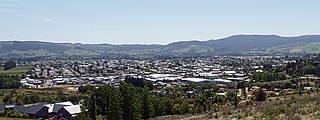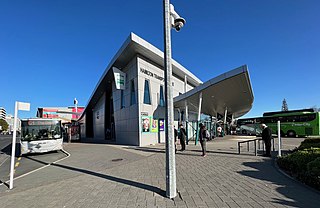
Otago is a region of New Zealand located in the southern half of the South Island administered by the Otago Regional Council. It has an area of approximately 32,000 square kilometres (12,000 sq mi), making it the country's second largest local government region. Its population was 254,600 in June 2023.

Queenstown is a resort town in Otago in the south-west of New Zealand's South Island. It has an urban population of 29,000.

Waikouaiti is a small town in East Otago, New Zealand, within the city limits of Dunedin. The town is close to the coast and the mouth of the Waikouaiti River.

Dunedin is the second-largest city in the South Island of New Zealand, and the principal city of the Otago region. Its name comes from Dùn Èideann, the Scottish Gaelic name for Edinburgh, the capital of Scotland. The city has a rich Māori, Scottish, and Chinese heritage.

Mosgiel is an urban satellite of Dunedin in Otago, New Zealand, fifteen kilometres west of the city's centre. Since the re-organisation of New Zealand local government in 1989 it has been inside the Dunedin City Council area. Mosgiel has a population of approximately 14,800 as of June 2023. A nickname for Mosgiel is "The pearl of the plain". Its low-lying nature does pose problems, making it prone to flooding after heavy rains. Mosgiel takes its name from Mossgiel Farm, Ayrshire, the farm of the poet Robert Burns, the uncle of the co-founder in 1848 of the Otago settlement, the Reverend Thomas Burns.

Otago Regional Council (ORC) is the regional council for Otago in the South Island of New Zealand. The council's principal office is Regional House on Stafford Street in Dunedin with 250-275 staff, with smaller offices in Queenstown and Alexandra. They are responsible for sustainably managing Otago’s natural resources of land, air and water on behalf of the community. Property owners pay rates to both the local and regional councils. In June 2022 the council approved an annual plan of $109m for 2022-2023 with an 18% rates rise.

Ritchies Transport is a New Zealand private bus operator, owned by KKR. It was established in 1972 and describes itself as "the largest privately owned bus and coach transport operator in New Zealand" with a fleet of over 1500 vehicles spread across depots nationwide. It owns a 46% stake in InterCity.
Transport in Invercargill, New Zealand is mostly by bus and private car.

Invercargill Passenger Transport Ltd was a bus company which operated public transport routes in Dunedin and Invercargill as well as school transport services in those cities as well as Queenstown and leisure and tourism transport services throughout the South Island of New Zealand

Urban bus transport is the main form of public transport in New Zealand. Two of the country's largest cities, Auckland and Wellington, also have suburban rail systems, while some cities also operate local ferry services. There are no rapid transit metros and no remaining tram systems active anywhere in New Zealand, though trams once had a major role in New Zealand's public transport.

Public transport in Auckland, the largest metropolitan area of New Zealand, consists of three modes: bus, train and ferry. Services are coordinated by Auckland Transport under the AT Metro brand. Waitematā railway station is the main transport hub.
A bicycle carrier, also commonly called a bicycle rack, is a device attached to a vehicle to transport bicycles.

The Snapper card is a contactless electronic ticketing card used to pay for bus and train fares in Wellington, New Zealand. It was introduced in Wellington in July 2008. Another version – the Snapper HOP card – was introduced to Auckland in 2011 and withdrawn from Auckland in late 2013. Snapper CityLink cards were introduced in Whangārei in March 2014 and withdrawn in September 2018. It was owned by Snapper Services Limited, a former subsidiary of Infratil until 2019 when it was sold to ICM Limited, a subsidiary of Allectus Capital.

The AT HOP card is an electronic fare payment card that was released in two versions on Auckland public transport services, beginning in May 2011. The smart card roll out was the first phase in the introduction of an integrated ticketing and fares system that was rolled out across the region.

Public transport in Hamilton and the Waikato Region consists mainly of bus services, as well as some limited train and ferry services. Services are mainly infrequent, and investment hasn't been sufficient to compete with cars, so that subsidies, first introduced in 1971, have increased.
National Ticketing Solution (NTS) is a public transport payment system in development for New Zealand. It is contracted to American company Cubic. It is expected to start roll out in the Canterbury region in 2024 and available nationwide by 2026.
The 2022 Otago Regional Council election began with postal voting on 16th Sept 2022 and ended at noon on Sat 8 October 2022, as part of the wider 2022 New Zealand local elections. Voting was by first past the post. The Otago Regional Council makes decisions about managing resources in the region, such as air, water, soil and the coastline. It also carries out plant and pest control, helps prepare for natural disasters, and is involved in regional transport, particularly buses. The council is made up of 11 councillors. Councillors are elected to represent constituencies. The previous election was in 2019 and there was some controversy in the council.
The 2022 Dunedin local elections were held via postal voting between September and October 2022 as part of the wider 2022 New Zealand local elections. Elections in Dunedin covered one territorial authority, the Dunedin City Council, and six community boards.
The Bee Card is an electronic fare payment smart card that is used on bus services in ten regions of New Zealand, along with Queenstown Ferries and the Te Huia train service between Hamilton (Waikato) and Auckland. It is used as a tag-on tag-off card on buses, with paper tickets remaining available for use for each of the individual region’s public transport network systems.















